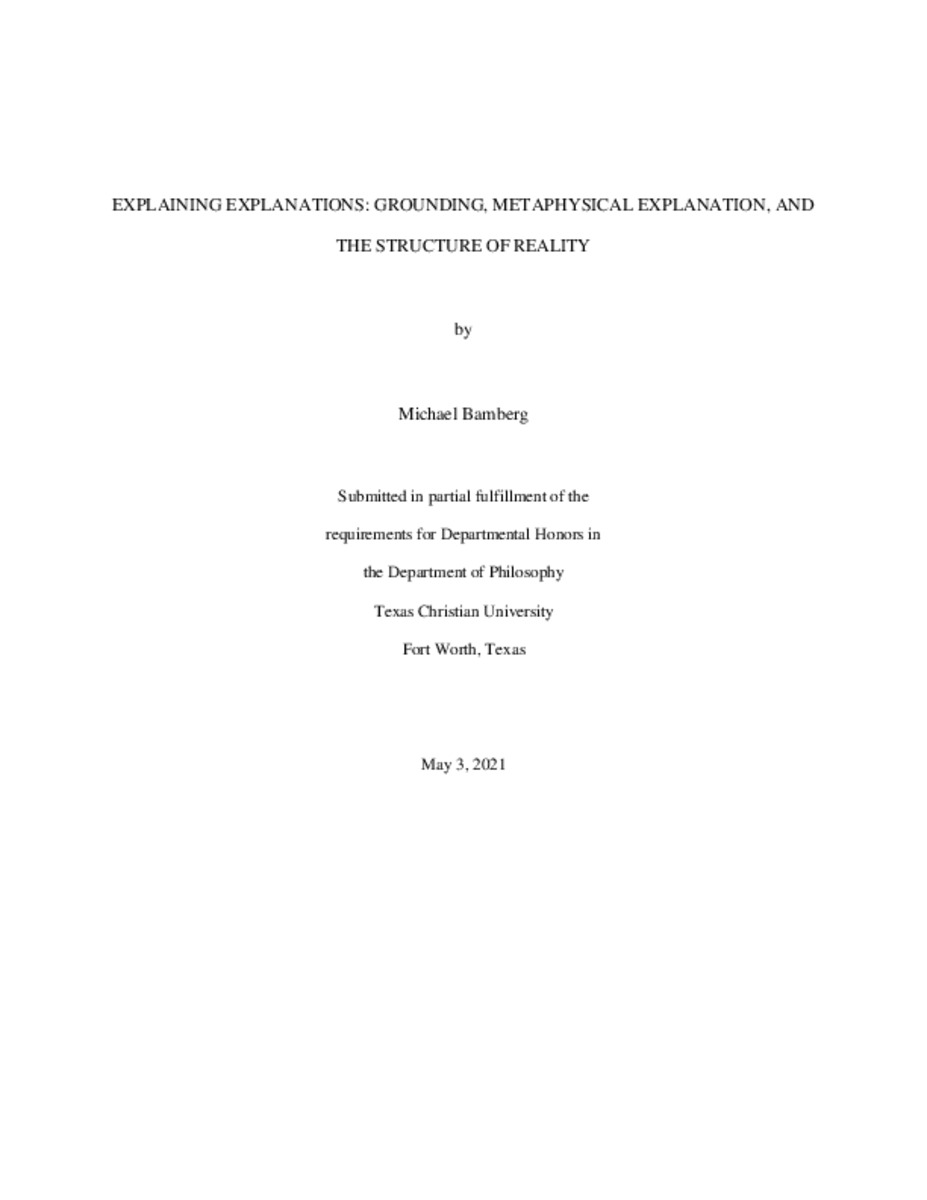Explaining Explanations: Grounding, Metaphysical Explanation, and the Structure of RealityShow full item record
| Title | Explaining Explanations: Grounding, Metaphysical Explanation, and the Structure of Reality |
|---|---|
| Author | Bamberg, Michael |
| Date | 2021 |
| Abstract | The goal of this thesis is to uncover the nature of the phenomenon known as Grounding and elucidate the role it plays in metaphysical explanation. More specifically, I argue that the posit of Grounding is needed in order to form successful accounts of metaphysical explanation. In order to motivate my position, I demonstrate that three principles of successful explanations correspond to three features of reality's structure. First, successful explanantia are able to express that the explanandum depends on the explanans. I refer to this principle as Dependence. The second feature I identify of successful explanations is what I call Distance; while multiple potential explanantia fully determine a given explanandum, an explanation is liable fail if it does not cite the correct explanans. Finally, I recognize that certain classes of explanantia are unable to explain a given explanandum in virtue of the category facts to which they appeal. This is a principle I call Unification. I argue that these features of explanations manifest because they are a product of reality's structure. First, I argue that Dependence is a function of fundamentality; we often take the explanans in a given explanation to be more fundamental than the explanandum. Further, our talk of fundamentality is largely univocal, and only by accepting some degree of univocality can we properly account for Dependence. Subsequently, I articulate the intuition that the entities embedded in this structural tapestry are more or less fundamental than others and proceed to explain the connection between relative fundamentality and the principle of Distance. Finally, I discuss the structural feature I call Layers, which states that reality's structure is partitioned into categories. Layers accounts for the principle of Unification by unifying the sorts of facts needed to support explanations. From there, I construct two viable views for metaphysical explanation. The Robust View posits a highly unified notion of structure and satisfies all the explanatory and structural features described in the foregoing paragraphs. In comparison, structure under the Hybrid View is more disunified and contains the least degree of structural unification needed to support a theory of explanation. The upshot of this account of explanation is that a certain class of metaphysical explanations track structure, and, insofar as we need Grounding to limn structure, the posit of Grounding is needed to account for these features of explanations. |
| Link | https://repository.tcu.edu/handle/116099117/49101 |
| Department | Philosophy |
| Advisor | Cray, Wesley |
| Additional Date(s) | 2021-05-19 |
Files in this item
This item appears in the following Collection(s)
- Undergraduate Honors Papers [1362]
Related items
Showing a few items related by title, author, creator and subject.
-
Pursuing an availability-heuristic explanation of lay evaluations of social psychological research findings
Richard, Francis Daniel (2002)Research scientists view obvious research findings as ¿trivial.¿ Lay persons may not share this belief. Studies have shown that research results in social psychology considered obvious are also considered important. The ... -
Control: a method for setting standards (an explanation and applications of response surface analysis techniques)
Lockerd, John Alvin (1960)
© TCU Library 2015 | Contact Special Collections |
HTML Sitemap




